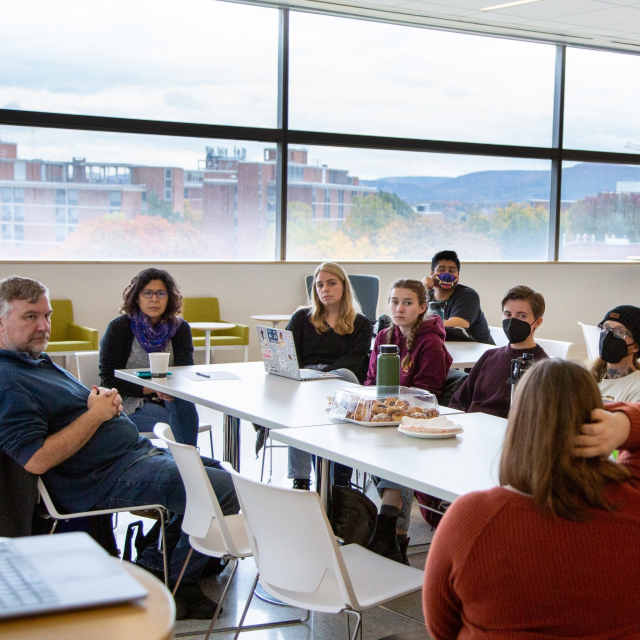Nov 30, 2022
Huck Grad Students Work Towards Inclusion
A discussion and advocacy group started by student leadership is pushing for dialogue and solutions to make the Huck a more welcoming and empowering space for scientists from all backgrounds.

On a Tuesday afternoon in a corner of the third-floor common area that connects the two wings of the Millennium Science Complex, a group of about fifteen people—mostly grad students, but with some older heads sprinkled in—is talking about indigenous data sovereignty over an untouched tray of pastries.
They pass heavy questions back and forth: how do you make sure that people from marginalized indigenous groups, living in low-income countries and many already the inheritors of generational colonialist violence and exploitation, are respected, compensated for, and in control of the scientific data taken from their communities and local ecologies? How can you reconcile doing important research at a land grant university which was granted stolen land? How much is possible in the real world of funding agencies and tenure tracks? How much can academics actually do before they’re jumping through hoops of their own design for their own gratification?
At this last point, one of the more experienced scientists at the table, Assistant Research Professor Eric Crandall, offers an anecdote from the field: filling out piles of paperwork to export a handful of snails as scientific specimens while a loosely regulated exotic pet trade plundered the biological wealth of fragile Pacific island ecosystems.
This group, organized by the Huck Grad Student Advisory Committee (HGSAC), is one of the newest sprouts of a seed planted in Penn State’s Astronomy department, where a discussion group called Towards a More Inclusive Astronomy (TaMIA) started meeting in 2016. TaMIA has since spread to other universities, including Michigan, CalTech, and Montana State, and HGSAC leaders decided to adopt the model after seeing its non-Astronomy success in Penn State’s Biology and BMB programs. Along the way, the name changed to fit, and Towards a More Inclusive Science—TaMIS—was born.
TaMIS has met three times so far this year, and always on the third Tuesday of each month. In addition to indigenous data sovereignty, they’ve held meetings on “An Inclusive Vision of Scientific Impact” and “LGBTQ+ in STEM.” On December 13, the semester’s final gathering will discuss “Financial and Access Barriers to Diversity and Inclusion.”
According to Alenka Hafner and Corrine Smolen, the chairs of the HGSAC and driving forces behind the TaMIS effort, the group has three goals:
- Provide support for those who have experienced pushback in life based on who they are, where they come from, what they believe in, or how they look, sound, speak, hear, think, move, feel, or understand the world
- Learn more as a community about the experiences of underrepresented voices
- Through discussion and action, serve as a catalyst for changes to teaching, mentoring and research practices that will lead to more inclusive life sciences
“It’s been incredibly rewarding to hear and learn from people from different backgrounds, especially since we have been able to come away with recommendations for change from every meeting,” said Smolen, a graduate student in Bioinformatics and Genomics. “As one of our goals is to move away from performative diversity and inclusion, we are working with Climate and Diversity committees to try and implement some of those actionable items.”
“It was always going to be challenging raising awareness about DEI issues on campus but we are very grateful for the support we have received from the Huck leadership and administration,” added Hafner, who is in the Plant Biology program. “The support from our peers has also been very encouraging; it seems like this type of forum was needed in the STEM community to allow open discussion of diversity and inclusion issues. We are hoping that more faculty and staff will be able to attend our events in the future as we want to discuss these topics with the larger life sciences community.”
More information about TaMIS, including upcoming meetings, can be found on the HGSAC website.